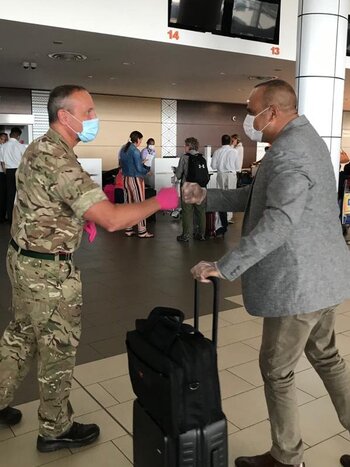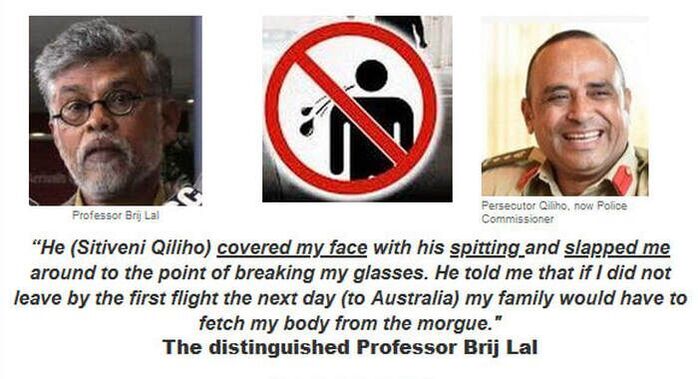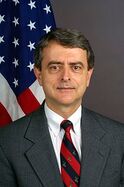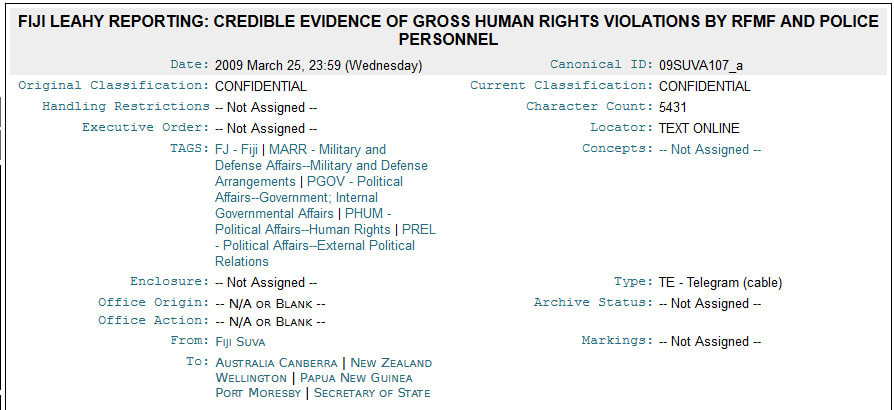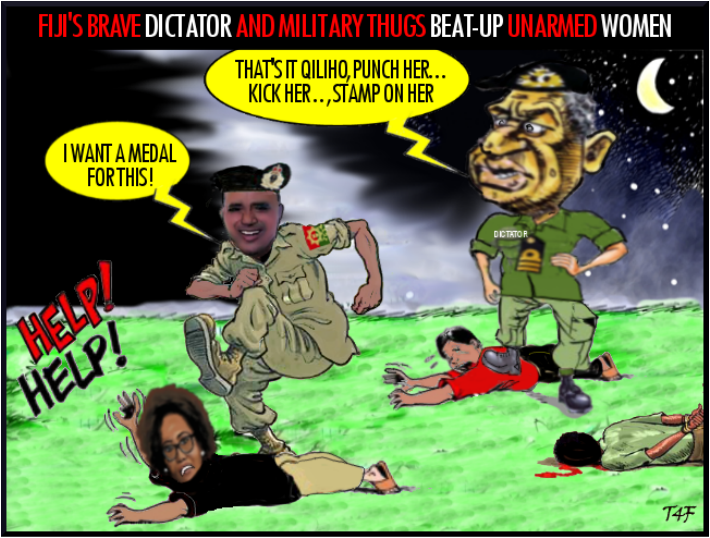SPEAKING TRUTH TO POWER:
US Ambassador Larry Dinger to Washington, 29 March 2007:
"Military promotions. 6. (C) The RFMF announced on March 28 the promotion of four officers from major to lieutenant colonel: Jone Kalouniwai, Sitiveni Qilio (Qiliho), Inia Seruivatu, and Ifereimi Vasu. Land Forces Commander Col. Driti said all four had worked hard and had been majors for a long time. Kalouniwai and Qilio (Qiliho) are on the
U.S. visa-sanction list. Vasu reportedly just completed studies at Malaysia's Military Staff Academy.
Military departures 7. (C)
The RFMF has acknowledged that ten officers have left the service since the coup. Some reportedly are lawyers, including Major Amani Bale, Major Davina Chan-Ligaiula, and Major Ana Rokomokoti, all of whom are on the U.S. visa-sanction list. Other departures include Navy Commander Bradley Bower, Lt. John Fong, Captain Joeli Pickering, Captain Solomone Raravula, and Captain Bernie Ramafono. We know Bower resigned in protest of the coup, though at the time the RFMF spokesman claimed there was no connection. Presumably some or all of the others were similarly motivated. DINGER "
EXPOSING TORTURE AT THE BARRACKS: The former Deputy Chief of Mission Richard Pruett in Fiji to his Masters in Washington
"Embassy Suva submits the following credible evidence of gross human rights violations by members of the Republic of Fiji Military Forces and the Fiji Police...They were beaten, punched, kicked, and made to crawl on all fours in the rain. One woman was allegedly asked whether she was pregnant and after she replied in the affirmative, a soldier stood on her stomach...While much of the alleged abuse was perpetrated by lower ranking and unknown RFMF soldiers, those detained reported that the following high ranking RFMF personnel were present, orchestrated and in some cases perpetrated the abuse: (3) Sitiveni Qiliho Tukaituraga, Colonel, DOB: 30 December, 1969."
Classified By: Deputy Chief of Mission Richard Pruett. Reasons 1.5 (b) and (d) 1. (C)
Summary: Embassy Suva submits the following credible evidence of gross human rights violations by members of the Republic of Fiji Military Forces and the Fiji Police. We have listed the individuals by name and then included a summary of the human rights abuses for which there is credible evidence of involvement. All are Fiji nationals. However, in most cases we lack other identifying information such as dates of birth.
Christmas Eve 2006 Detention, Assaults and Abuse
2. (C) At midnight on Christmas Eve 2006, six pro-democracy activists were forcibly removed from their homes and taken to the RFMF headquarters at Queen Elizabeth Barracks in Suva. According to independent statements by several of the individuals, during the course of the night, RFMF personnel subjected them to humiliating and degrading treatment, including physical assault and verbal abuse.
They were beaten, punched, kicked, and made to crawl on all fours in the rain. One woman was allegedly asked whether she was pregnant and after she replied in the affirmative, a soldier stood on her stomach.
One man was allegedly asked who was Fiji's president, and upon answering (then-deposed) &Ratu Iloilo, 8 was repeatedly kicked by the soldiers.
Another woman said that RFMF soldiers blindfolded her, put an unloaded gun to her temple and fired repeatedly. The group was then forced to run in the rain from the military camp to a location several miles away, where they were compelled to remove anti-coup slogans from the walls of a house.
Before release, RFMF soldiers allegedly warned them that if they spoke out again they would be taken back up to the military camp and suffer worse treatment, as would their families.
3. (C) While much of the alleged abuse was perpetrated by lower ranking and unknown RFMF soldiers, those detained reported that the following high ranking RFMF personnel were present, orchestrated and in some cases perpetrated the abuse:
(1) Tevita Ului Mara, Colonel, Chief of Staff, Land Force, and Commanding Officer of the RFMF Third Infantry Regiment, DOB: 25 May 1965
(2) Pita Driti, Colonel, Land Forces Commander, DOB: 29 October 1960
(3) Sitiveni Qiliho Tukaituraga, Colonel, DOB: 30 December, 1969
Summary: Embassy Suva submits the following credible evidence of gross human rights violations by members of the Republic of Fiji Military Forces and the Fiji Police. We have listed the individuals by name and then included a summary of the human rights abuses for which there is credible evidence of involvement. All are Fiji nationals. However, in most cases we lack other identifying information such as dates of birth.
Christmas Eve 2006 Detention, Assaults and Abuse
2. (C) At midnight on Christmas Eve 2006, six pro-democracy activists were forcibly removed from their homes and taken to the RFMF headquarters at Queen Elizabeth Barracks in Suva. According to independent statements by several of the individuals, during the course of the night, RFMF personnel subjected them to humiliating and degrading treatment, including physical assault and verbal abuse.
They were beaten, punched, kicked, and made to crawl on all fours in the rain. One woman was allegedly asked whether she was pregnant and after she replied in the affirmative, a soldier stood on her stomach.
One man was allegedly asked who was Fiji's president, and upon answering (then-deposed) &Ratu Iloilo, 8 was repeatedly kicked by the soldiers.
Another woman said that RFMF soldiers blindfolded her, put an unloaded gun to her temple and fired repeatedly. The group was then forced to run in the rain from the military camp to a location several miles away, where they were compelled to remove anti-coup slogans from the walls of a house.
Before release, RFMF soldiers allegedly warned them that if they spoke out again they would be taken back up to the military camp and suffer worse treatment, as would their families.
3. (C) While much of the alleged abuse was perpetrated by lower ranking and unknown RFMF soldiers, those detained reported that the following high ranking RFMF personnel were present, orchestrated and in some cases perpetrated the abuse:
(1) Tevita Ului Mara, Colonel, Chief of Staff, Land Force, and Commanding Officer of the RFMF Third Infantry Regiment, DOB: 25 May 1965
(2) Pita Driti, Colonel, Land Forces Commander, DOB: 29 October 1960
(3) Sitiveni Qiliho Tukaituraga, Colonel, DOB: 30 December, 1969
Gathering perspectives on human rights.
5 (C) In the other meetings, DAS Davies received a variety of views of the coup and subsequent events. Former Qarase-government officials and civil-society representatives were very appreciative of the strong stance the U.S. has taken with Fiji.
They encouraged us to keep the pressure on the military and the interim government, including with visa sanctions which, they said, clearly are having a salutary effect. Three human-rights activists noted firm evidence that senior RFMF officers have led the intimidation of human-rights leaders and the media.
Virisila Buadromo of the Fiji Women's Rights Movement identified Land Forces Commander Col. Pita Driti as leading the group that abused her early Christmas morning. The activists named 3FIR Commander LtCol. Ratu Tevita Mara and Major (now LtCol.) Qiliho as others who clearly have led such abuses. (All are on the U.S. visa ban list.)
The activists said abuses continue, though military intimidation has reduced media attention.
Activists were very skeptical of the "Public Charter" concept, predicting that it will be an orchestrated attempt to give the interim regime unwarranted legitimacy. DINGER
(Note: The USG revoked [Aiyaz] Sayed-Khaiyum's 10-year visa in early 2007, notifying him by phone and letter. Interestingly, on the transit-visa application, Sayed-Khaiyum checked the box indicating he had never had a U.S. visa revoked.) Larry Dinger, then US ambassador to Fiji, in Wikileaks cable to Washington, May 11, 2008
Interim AG goes public with UN visa-denial complaint
--------------------------------------------- --------
1. (U) Fiji's interim Attorney General Aiyaz Sayed-Khaiyum phoned Suva media from Vienna on Friday, May 9, to make public his unhappiness at Embassy Suva having denied him a visa to transit Los Angeles to and from a U.N conference in Vienna. He also complained that the U.S. denial came at "the eleventh hour." Sayed-Khaiyum said the interim government (IG) is filing a complaint with the UN in New York. We provide background.
The actual story
----------------
2. (SBU) Embassy Suva received a dipnote from Fiji MFA on the afternoon of Wednesday, April 30, seeking transit visas of LA for May 6 and 9/10 to facilitate Sayed-Khaiyum's attendance at a meeting in Vienna of the Expanded Pilot Review Group on the implementation of the UN Convention Against Corruption. The same afternoon, we informed EAP/ANP of the request and sought Washington's response, given that Sayed-Khaiyum is on the Fiji post-coup visa-sanction list.
(Note: The USG revoked Sayed-Khaiyum's 10-year visa in early 2007, notifying him by phone and letter. Interestingly, on the transit-visa application, Sayed-Khaiyum checked the box indicating he had never had a U.S. visa revoked.)
On the morning of Friday, May 2, EAP/ANP provided Washington's response to deny the visa. We immediately phoned MFA and followed up with a dipnote, delivered the same day. On Monday, May 5, Sayed-Khaiyum phoned the Embassy and had a polite conversation with DCM Mann, who confirmed the USG denial of the transit-visa request.
U.S. policy re UN-related visa requests
---------------------------------------
3. (SBU) To the best of our knowledge, USG policy on UN-related visas for those on the Fiji visa-sanction list is to allow an exception in those cases where travel is to New York or elsewhere in the U.S. for UN business, acknowledging a U.S. obligation under the UN headquarters agreement. Similarly, the USG has permitted travel to Washington for World Bank/IMF meetings. In Sayed-Khaiyum's case, the meeting was not in the U.S. but in Vienna; and, as he has demonstrated, he had an alternative route to get there: via Seoul.
Media coverage and reactions
----------------------------
4. (SBU) Fiji media have given Sayed-Khaiyum's public complaint reasonable coverage. Over the weekend, Embassy Suva responded to media requests for comment by noting that USG visa sanctions on interim government ministers remain in place.
We have not yet commented on the UN angle, though we did so in the past in relation to interim PM Bainimarama's attendance at the UNGA last September.
From what we hear, Sayed-Khaiyum's revelation that the USG denied the visa has given heart to a number of opponents of the IG, who rightly perceive Sayed-Khaiyum to be one of the IG's most outspoken defenders of restraints on human-rights.
Such restraints have included deportation of media publishers and, for some Fiji citizens, restraints on travel abroad. One blog noted over the weekend that last year the IG (Sayed-Khaiyum) refused to permit travel by a Fiji-citizen employee of the UN's Suva office to a UN conference in Tonga. [Larry] DINGER (Wikileaks)
Making misrepresentations on an application for immigration benefits is a ground of inadmissibility under U.S. Immigration Law. The former ambassador Larry Dinger's cable (Wikileaks) clearly state Aiyaz Sayed Khaiyum LIED on his Visa Application in 2008
--------------------------------------------- --------
1. (U) Fiji's interim Attorney General Aiyaz Sayed-Khaiyum phoned Suva media from Vienna on Friday, May 9, to make public his unhappiness at Embassy Suva having denied him a visa to transit Los Angeles to and from a U.N conference in Vienna. He also complained that the U.S. denial came at "the eleventh hour." Sayed-Khaiyum said the interim government (IG) is filing a complaint with the UN in New York. We provide background.
The actual story
----------------
2. (SBU) Embassy Suva received a dipnote from Fiji MFA on the afternoon of Wednesday, April 30, seeking transit visas of LA for May 6 and 9/10 to facilitate Sayed-Khaiyum's attendance at a meeting in Vienna of the Expanded Pilot Review Group on the implementation of the UN Convention Against Corruption. The same afternoon, we informed EAP/ANP of the request and sought Washington's response, given that Sayed-Khaiyum is on the Fiji post-coup visa-sanction list.
(Note: The USG revoked Sayed-Khaiyum's 10-year visa in early 2007, notifying him by phone and letter. Interestingly, on the transit-visa application, Sayed-Khaiyum checked the box indicating he had never had a U.S. visa revoked.)
On the morning of Friday, May 2, EAP/ANP provided Washington's response to deny the visa. We immediately phoned MFA and followed up with a dipnote, delivered the same day. On Monday, May 5, Sayed-Khaiyum phoned the Embassy and had a polite conversation with DCM Mann, who confirmed the USG denial of the transit-visa request.
U.S. policy re UN-related visa requests
---------------------------------------
3. (SBU) To the best of our knowledge, USG policy on UN-related visas for those on the Fiji visa-sanction list is to allow an exception in those cases where travel is to New York or elsewhere in the U.S. for UN business, acknowledging a U.S. obligation under the UN headquarters agreement. Similarly, the USG has permitted travel to Washington for World Bank/IMF meetings. In Sayed-Khaiyum's case, the meeting was not in the U.S. but in Vienna; and, as he has demonstrated, he had an alternative route to get there: via Seoul.
Media coverage and reactions
----------------------------
4. (SBU) Fiji media have given Sayed-Khaiyum's public complaint reasonable coverage. Over the weekend, Embassy Suva responded to media requests for comment by noting that USG visa sanctions on interim government ministers remain in place.
We have not yet commented on the UN angle, though we did so in the past in relation to interim PM Bainimarama's attendance at the UNGA last September.
From what we hear, Sayed-Khaiyum's revelation that the USG denied the visa has given heart to a number of opponents of the IG, who rightly perceive Sayed-Khaiyum to be one of the IG's most outspoken defenders of restraints on human-rights.
Such restraints have included deportation of media publishers and, for some Fiji citizens, restraints on travel abroad. One blog noted over the weekend that last year the IG (Sayed-Khaiyum) refused to permit travel by a Fiji-citizen employee of the UN's Suva office to a UN conference in Tonga. [Larry] DINGER (Wikileaks)
Making misrepresentations on an application for immigration benefits is a ground of inadmissibility under U.S. Immigration Law. The former ambassador Larry Dinger's cable (Wikileaks) clearly state Aiyaz Sayed Khaiyum LIED on his Visa Application in 2008
